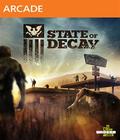State of Decay, which seemed like it could've been an exciting take on video game horror, ended up feeling like a test run for something bigger. It's a title that I desperately want to enjoy, and at times, I was genuinely impressed with its ambition, but a laundry list of bugs, glitches, listless characters, and half-baked mechanics make it feel like something that snuck out of a beta phase.
Developer Undead Labs came together to make zombie games. It started off with the desire to make something akin to World of WarCraft and was sort of beat to the punch with the popular ArmA II PC mod, Day Z. State of Decay lacks the MMO qualities that Undead Labs might have originally been shooting for, but it's easy to see how State of Decay's open-world setting could easily translate to an online space. As a single-player experience, the lack of player presence makes this open world feel somewhat hollow, causing you to wonder how much fun this could've been as an open-ended console experience that's populated with friends and strangers.
Still, State of Decay offers up an impressive level of scope and ambition. The game begins with your return to civilization after a recent camping expedition. Having cut yourself off from the rest of the world for a while, you're surprised to learn that things have gone to hell. Fending off a zombie attack is the first order of business, and you're quickly paired up with your friend and a third survivor. This leads to the discovery that everything has essentially been decimated in a zombie apocalypse.
This initial pairing and story build-up gives you an adequate glance at what State of Decay brings to the table. When you pair up with the first survivor, you'll have an opportunity to do some early exploring, and it gives way to a hefty amount of land that you can cover on foot or by vehicle. I'm not sure how this compares to other popular open-world titles like Grand Theft Auto IV, but State of Decay certainly seems to have a lot of virtual real estate. For the most part, Undead Labs does a good job of populating the land with things to do or places to explore. There are a couple of empty swatches here and there, but if you're willing to go off the beaten path, you can often be rewarded for your effort with gear, supplies or weapons. Zombies are everywhere, so the undead pop up a lot; sometimes, they're oblivious to your actions, and other times, they swarm you from all sides.
The concept of a world gone to hell is handled really well in State of Decay. The environment is drab and lifeless, and the structures are abandoned, broken down and looted. While exploring spaces and looking for supplies feels very mechanical and gamey, I enjoyed the randomness of the loot and felt that there was an appropriate level of desperation tied to the scavenging. Loot isn't handled as a collect-a-thon; instead, you actively seek out items because you need them. It's the biggest thing that State of Decay does right, giving you lots of abandoned structures to explore and loot, and potentially putting those places to use as limited outposts or a new base of operations. I also liked the idea that noise is made while looting, with optional abilities to loot stashes faster but at the cost of being discovered sooner.
State of Decay also does a good job of implementing a sense of building and maintaining a community of survivors. The idea feels current considering the popularity of "The Walking Dead," which not only focuses on the typical scares and action that come with fending off the undead, but also the drama involved in putting together a group of survivors and reestablishing civilization.
In State of Decay, you do this by building up a base, housing survivors, and attempting to outfit it with enough supplies to live through the continuous day and night cycles while fending off the occasional zombie attack. Survivors don't always get along with one another, are often cranky, and have various needs to fulfill, like hunger and sleep. Each base you discover or build can be upgraded in a variety of ways, with different areas built to house more beds, medical supplies, or watchtowers to fend off stray zombies. It pays to tend to the needs of your survivors because every member of the community has the potential to be a playable character.
This survivor maintenance is extremely useful because death is permanent in State of Decay, another intriguing aspect that's often referred to in video games as "permadeath." If you allow your controlled character to be overcome by a zombie horde, you'll automatically step into the shoes of the next available character. The pain of loss isn't reflected in an emotional sense, which is unfortunate, but if you've spent some time building up the skills of a single character, it can be a real shot to the gut to see him or her be consumed.
That's where the positives end for State of Decay. Despite putting an early emphasis on stealth and not engaging zombies directly, you're often stuck going toe-to-toe against the undead when outside the confines of your base. Even during the day, when they seem less likely to be roaming around, combat is inevitable. Stealth works to a limited degree, but movement is incredibly slow, and zombie line of sight is largely unpredictable.
Melee combat is a core survival tool, with breakable objects like wrenches, lead pipes, and two-by-fours as your typical weapons. Zombie beat-downs are often an arduous process, with a single, limited attack. You only get the option to instantly kill an enemy after you've knocked it to the ground. If you encounter more than two zombies at once, it's in your best interest to hightail it out of there, but the inclusion of a stamina meter that drains far too quickly makes survival unlikely unless there's a vehicle nearby.
Whether you're running or fighting, encounters are tedious breaks in your exploration that occur too frequently, and you'll find that trying to do anything by foot is a mistake. On a positive note, vehicles are abundant, but they quickly become a crutch. Encounters boil down to driving up and down streets, gathering zombie attention, running them over, and then clearing houses. It becomes boring and repetitive, but it's the only alternative to avoiding the equally bland and aggravating combat.
There are some ranged options, with different gun types scattered about and limited ammo reserves to exploit, but aiming is atrocious. By the time you score a headshot, you've probably drawn out every zombie in every house surrounding your position, effectively making the situation worse. There's an element of realism to that, but it makes ranged combat feel overly punishing.
Another element that misses the mark is the narrative and character progression. When the game begins, you start off with your best friend, who is quickly afflicted after an attack and forces you to keep him alive. As playable characters live and die or as you step into the shoes of another to give someone a chance to rest, that best friend role seems interchangeable for the sake of story progression, and that feels really odd. There's also little impact to the group when someone dies, other than some loss in stats.
Even significant story characters who meet their demise are given little regard by other survivors, and that stands out even more when groups of survivors come in and a member of the group dies later, and there's little to no reaction from his or her friends. This lack of emotion makes most characters feel like they're there for visual variety, starting loadouts, and skill sets. As a result, it's tough to get concerned when someone dies or goes missing because you've been negligent or have ignored warning signs.
Finally, if there's a game that needs more time with quality assurance, it's State of Decay. Whether it's constant frame rate issues, poor pathfinding by accompanying survivors, or zombies clipping through various objects, you'll encounter a glitch or bug every few minutes. There's very little here that is considered game-breaking, as I never had any freeze-ups or loss of data, but the number of visual and scripting bugs that plague the title make for a really poor experience just about every time you pick up the controller. You'll see zombies stuck in the middle of walls, lootable objects that can't be looted, sudden vehicle ejections, laughable physics, and more. State of Decay has other issues, but I would've been a lot more forgiving if it didn't feel like a mess every time I played it.
State of Decay has a lot of promise, and there's the potential for Undead Labs to carry some of these concepts into something a bit more fleshed out, but I'm not a big fan of using full releases as testing grounds, which is what State of Decay feels like. I can't suggest this one unless you're willing to look past all the bugs and glitches that plague it, and even then, this is an experience best demoed and not purchased (1,600 Microsoft points or $20). There are some fresh concepts in State of Decay, but there aren't nearly enough for you to look past its problems.
Score: 6.0/10
More articles about State of Decay













 The end is here. Life as you knew it has gone to hell after the mother of all zombie outbreaks. Now you and the few scattered survivors must band together to survive and rebuild in a 3rd-person action game set in a dynamic open world.
The end is here. Life as you knew it has gone to hell after the mother of all zombie outbreaks. Now you and the few scattered survivors must band together to survive and rebuild in a 3rd-person action game set in a dynamic open world. 













